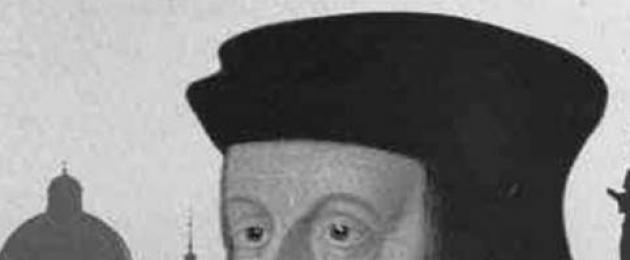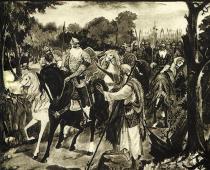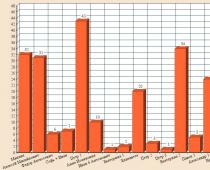Jan Hus (1369-1415) - national hero of the Czech Republic, preacher, priest, thinker, worked as rector of the University of Prague. He was burned at the stake along with all the labors, such an execution served as a prerequisite for the start of hostilities conducted by the followers of Jan Hus, in history they were called "Hussite wars".
Childhood
The period of the Middle Ages is still far from us, so that we can know exactly when Jan Hus was born. According to some sources, he was born in 1369, according to others - in 1371. This happened in a small town Gusinec, located in the south of the Czech Republic. In those days, the concept of “surname”, which had gone with Ancient Rome, was just beginning to revive. So Jan Hus got his last name by the name of the city in which he was born - Gusinets.
The peasant family where the boy was born was very poor. Biographers managed to establish that his father's name was Mikhail and in the family, in addition to Jan, there were two more sons. Despite the poverty, the parents really wanted to send the child to school, hoping that he would learn and become a priest. At the end of the XIV century, for a poor boy from an humble family, school was the only way to break into people. The parents of Jan Hus perceived schooling as a road not to knowledge at all, but to a quiet future life, relative material well-being, and good nutrition.
The nearest educational institution was in the town of Prachatice, it took a whole hour to walk from Gusinets. And the boy went to this school, spending two hours a day on the road (there and back). Compared to his hometown, Prachatitsa seemed bright and big to the child, the main road to Prague, southern Germany and Austria passed through it. A cathedral was built in the city, which seemed huge to little Jan. And also in Prachatice, by that time, various types of crafts had already developed, which to this day glorify the Czech Republic, especially the manufacture of wonderful glass and silver shiny products.
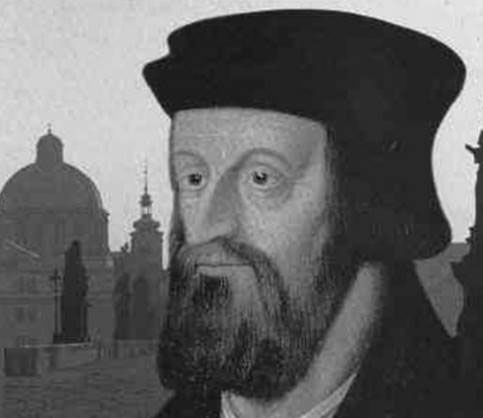
The main school subjects for Jan Hus were rhetoric, dialectics and grammar. Astronomy, arithmetic and natural sciences were added in the senior classes.
university
Despite financial difficulties and poverty, the family made every effort to promote Yang further. At the age of 18, the guy graduated from high school and went to Prague with his mother to enter the university. Today this educational institution is one of the oldest universities in Europe.
Mom decided to present gifts to the university authorities in the form of a live goose from the farmstead and a large soft white roll. However, already on the very outskirts of Prague, the goose escaped, and my mother had to please the leadership of the educational institution with only one roll. Either the pastries turned out to be too tasty, or Jan’s knowledge was worthy, the guy was still accepted to the university.
The educational institution had three faculties - medical, theological and liberal arts. Jan Hus entered the Faculty of Arts, because studying at the other two was much more expensive, although then his whole life was connected with theology, or rather with its criticism.
The student years of Jan Hus passed in complete poverty. He ate only pea soup, because it was cheaper than all other food. He had nothing to even buy dishes for. Each time he made himself a spoon of breadcrumbs in the hope that it would serve him for a long time. But all the time he ate this bread spoon of his along with the stew, as he was incredibly hungry.
In 1393, Jan Hus received a bachelor's degree, and in 1396 - a master of arts.
Teaching activity
During his studies at the university, Jan Hus showed a penchant for theology (the science that studies religion). Therefore, immediately after he received a master's degree, Gus was offered to stay in an educational institution and engage in teaching activities.
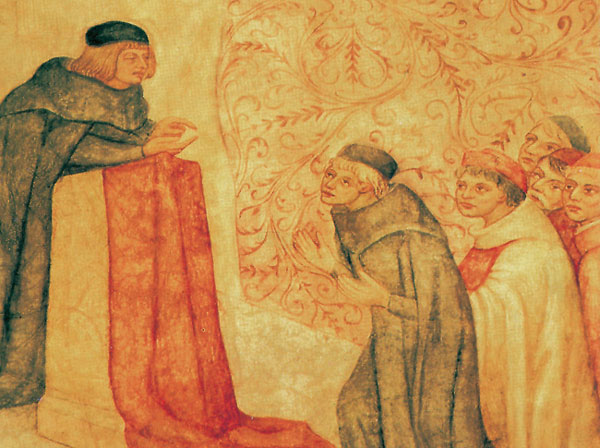
The young teacher thought freely. With his students, Hus began to study the writings of the English theologian and professor at Oxford University, John Wycliffe, despite the fact that his works in the field of theology in 1382 were recognized as heretical. However, Yang was not afraid of this, he not only expounded Wycliffe's theory to students, but also developed it. Hus rejected the spiritual unlimited power of the Pope, arguing that the true head of the Catholic Church is Jesus Christ. And Jan denounced the wealth of the church much more categorically than Wycliffe.
Despite the fact that Jan Hus was a freethinker, and Wycliffe's writings were publicly burned at the stake, in 1401 the young teacher was appointed dean of the Faculty of Philosophy, and in 1402 rector at the University of Prague.
Jan Hus was the first rector in this educational institution, who was a Czech by nationality, until 1402 only the Germans bothered to take such a position. In addition, it was an amazing career for the son of poor peasants.
preaching activity
Career growth was explained by the fact that Gus, in addition to his broad education, had undeniable talents and was a very popular speaker at that time. Since 1401, Hus conducted sermons in the church of St. Michael, at which many people gathered. And the very next year, in 1402, he was appointed preacher and rector in the private Bethlehem chapel, which was located in the old part of Prague. This chapel was founded in 1391 and differed from the rest in that services were conducted in it not in Latin, but in Czech. At times, about three thousand people gathered to preach to Hus.
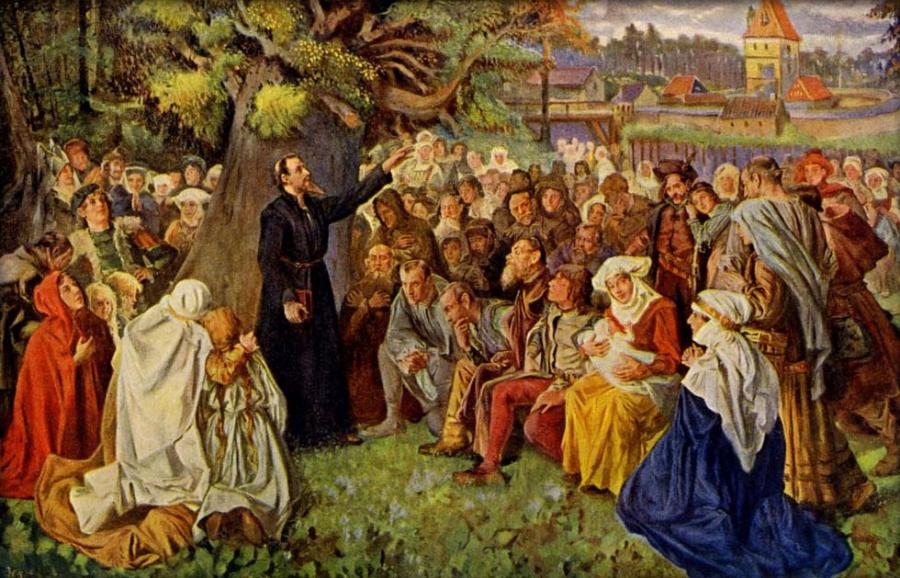
In his stories, Yang touched on everyday life, which was very unusual for that time. Despite the fact that he himself was a deeply religious person, he criticized the church and revealed the shortcomings of people in church service. His opinion went against the official policy of the Catholic Church:
- Priests were not to be engaged in the sale of church offices and sacraments. Money could be taken only from the rich, and then in a small amount necessary to satisfy the first vital needs of the clergyman.
- Despite the fact that one wants a calm and prosperous life, every Christian should not be afraid to risk it in search of the truth.
- The successors of Christ must be poor, like the apostles. And they, on the contrary, only think about increasing their wealth.
- Blind submission to the church is unacceptable, it is necessary to think with your own head. Hus cited the words from the Holy Scriptures to this thesis: “If the blind lead the blind, both will end up in a pit.”
- Only fair people deserve property. If a rich man is unjust, then he is a thief.
- Authority that violates God's commandments cannot be recognized by him.
Others also observed the depraved and cynical life of the clergy, but were afraid of punishment and tried to keep quiet. Hus silence was unusual, he began to fight. Yang was well aware of how dangerous his decision was, because he knew how heretics were burned at the stake by the Inquisition throughout Europe.
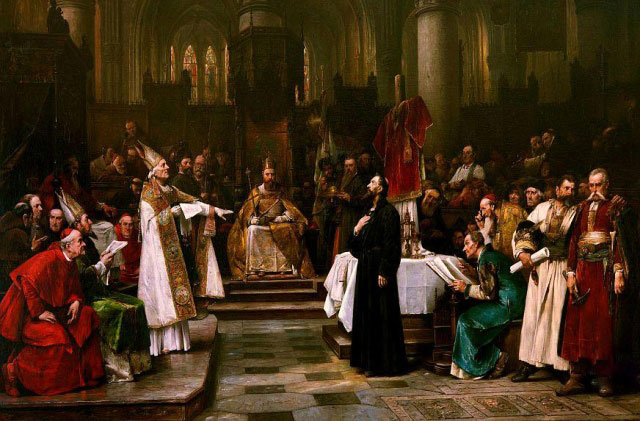
Hus used more than just cathedral sermons to promote the teachings. At his direction, the walls in the Bethlehem chapel were painted with edifying scenes. He is the author of several songs that have gone to the people, and a reformer of Czech spelling. Thanks to his Latin work "Czech Orthography", books became more accessible to ordinary people. He owns the development of diacritics.
Among other things, Jan was also a passionate patriot of the Czech Republic. He owns the translation of the Bible into Czech, thus he took away from the priests their exclusive right to earn money on its interpretation. Hus was also an ardent opponent of German dominance in the Czech Republic. Although in 1212 the Czech Republic received legal recognition of independence, there were still Germans in all key positions (rectors, burgomasters, military commanders). Jan Hus preached that "in the Kingdom of Bohemia, according to the law of nature, Czechs should be the first in office."
Persecution and execution
Increasingly large crowds of people gathered at the sermons of Jan Hus, and the heads of church institutions became increasingly restless, in the person of this preacher they saw their terrible and dangerous enemy.
In 1408 Hus's friends were arrested and accused of heresy. And in 1409, now against Jan himself, the Pope of Rome issued a bull (a bull is the most important papal document with a lead seal). According to this bull, the Archbishop of Prague took punitive action against Hus: he was forbidden to preach, and all of Jan's books were collected and burned.
But the influence of Hus on ordinary people continued to grow, and then in 1411 the Archbishop of Prague called him a heretic.
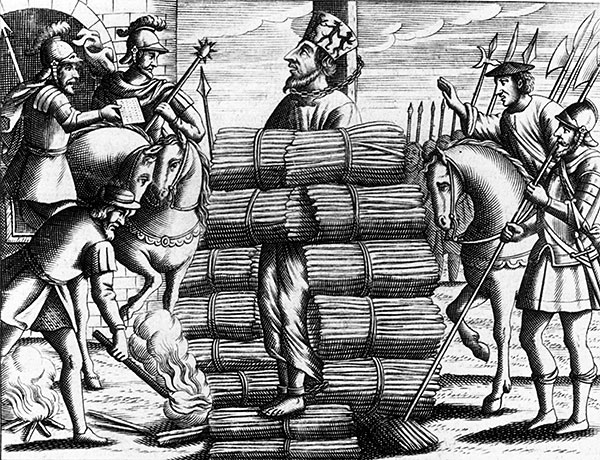
In the autumn of 1414, the patience of the Pope also ran out. On his initiative, Hus was summoned to the Ecumenical Council in the city of Konstanz. The preacher was told that the highest church hierarchs wanted to listen to him personally and understand the course of his thoughts.
At that time, the Czech Republic was legally subordinate to Emperor Sigismund, he also attended the Ecumenical Council. By his order, Jan Hus was given a safe-conduct, which guaranteed the preacher an unhindered return to Prague. However, it later turned out that Sigismund not only deceived Hus by giving him the usual travel document, but also demanded the death penalty for Jan at the stake.
Hus was accused of heresy, as well as that he organized the expulsion of the Germans from the University of Prague. He was arrested and imprisoned in the dark, damp cellar of a Dominican monastery. Hus was required to renounce his heretical views and repent. But Yang wrote a statement to the council: “They want me to recant. But then I will betray my conscience and put to shame the faith of Christ. If I renounce the truth, then how can I then look at the sky and into the eyes of my people? I will never do that."
He was sentenced to death, which was executed on July 6, 1415. Hus was taken out of the city of Constanta to a meadow, where in the middle they stuck a sharp wooden stake like a pillar into the ground. The preacher was tied to him with ropes and chains, and heaps of firewood, brushwood, bundles of straw were laid out around him. He, already consumed by the fire, was offered for the last time: “Repudiate!” Gus did not do this and burned alive. After burning, so that no remains of him remained on the ground, the ashes were thrown into the stream of the Rhine River.
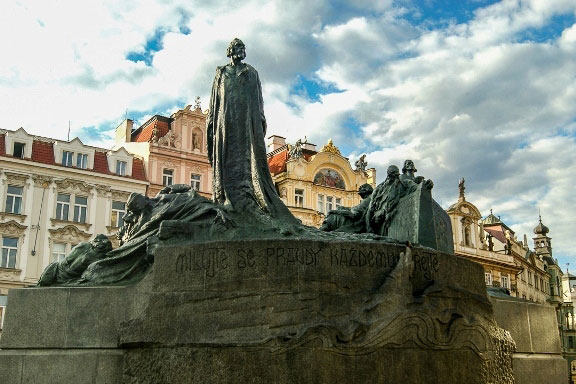
The execution of Jan Hus led his followers (the Hussites) to go to war against the Catholics. The Hussite wars turned out to be devastating for Europe, lasted from 1419 to 1434, neither side achieved any significant results, and the opponents were forced to compromise.
Until today, Jan Hus has not been rehabilitated by the Catholic Church. Nevertheless, in today's Czech Republic, he enjoys great respect, he is revered as a fighter for national identity against the Germans. Many monuments have been erected to him, a large number of museums and streets bear the name of Jan Hus.
In 1915, in the center of Prague on the Old Town Square (this is an old square located in the historical part of the city of Old Town), a monument to Jan Hus was erected on the day of the 500th anniversary of his execution.
Jan Hus has been mentioned more than once in poetry. Taras Shevchenko wrote his poem “The Heretic” about him, Fyodor Tyutchev dedicated the verse “Gus at the stake” to him, Yevgeny Yevtushenko recalled Jan Hus along with Pushkin and Petofi in his work “Tanks are moving through Prague ...”
- In contact with 0
- Google+ 0
- OK 0
- Facebook 0

